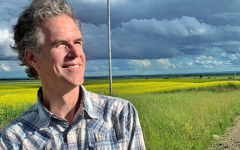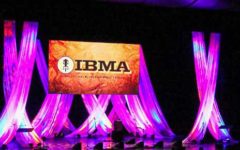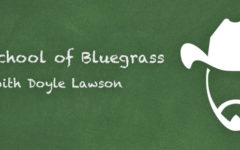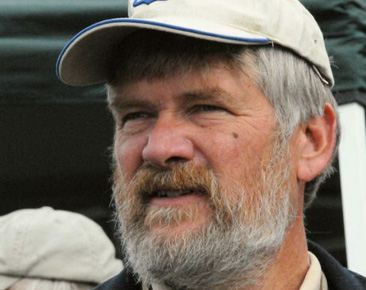
 With my return to the Carrboro/Chapel Hill, NC area in April to join the staff of The ArtsCenter, life has been largely a reunion recently. Two recent trips to the mountains possibly turned out even more poignant for me in connecting with people whose relationships through old-time, bluegrass, and folk music go back three decades.
With my return to the Carrboro/Chapel Hill, NC area in April to join the staff of The ArtsCenter, life has been largely a reunion recently. Two recent trips to the mountains possibly turned out even more poignant for me in connecting with people whose relationships through old-time, bluegrass, and folk music go back three decades.
The first, and much sadder, was the visitation for Doc Watson on June 2. A conflict prevented me from attending the funeral on Sunday, but I did run up to Deep Gap Saturday night.
Arrangements had been made for a much larger gathering. The Highway Patrol blocked one lane of east bound US421 the fed the church entrance. I originally drove to its old location in the valley below – found the for sale sign – then found my way to the capacious new one.
Musicians filled its balcony, picking for Doc this time. T. Michael Coleman, who played bass with Doc, Merle, and Jack Lawrence for more than a decade, was back where his career began. Kari Estrin recalled how Merle warned that a business partner was cheating her. Long time touring partner David Holt, who regarded Doc as a mentor, and his wife Ginny Calloway were there, as was Mitch Greenhill, Doc’s agent and Merle’s friend.
I visited with Jeff Little, whom Doc considered a pianist who could play like him, and David Deal, who had manipulated the brake and accelerator for the Docabilly cover photo of Doc driving a car. With David I heard the more than poignant story of the widowed, no longer articulate RosaLee seeing Doc’s empty chair the day before and realizing what had transpired.
I walked in with Cindy and Terry Baucom, who live more than an hour away in Elkin. I spoke to Doc’s brothers, Jeff Coffey, and John Adair, the only current MerleFest full time staffer there, and Claire Armbruster, whom he replaced. Adair and Cliff Miller, the MerleFest sound and light genius and one time substitute for Merle, who had brought portajohns and sound equipment, seemed to share the organizing responsibility. Robert Doyle, who has overseen artist transportation at MerleFest since its inception and frequently drove Doc, grandson Richard, and Holt to gigs, gave out parking passes for the Sunday service.
Dinner with many of the above at a Boone restaurant helped us process our loss.
Doc’s passing also led me to The State of Things, the widely imitated noon-time program hosted by Frank Stacio on North Carolina Public Radio. Reconnecting with Robert Cantwell, author of Bluegrass Breakdown and When We Were Good, and fiddler and mandolinist Jim Collier provided highlights of that packed hour. The show also featured guitarist Danny Gotham and old-time banjo player and guitarist Joe Newberry, who frequently tours with Mike Compton. I had already visited with them at a Will The Circle Be Unbroken live recreation concert Danny organized to benefit transplant charities in honor of Jan Johansson. As an aside, I learned that Jan’s father passed away in Sweden in mid-June.
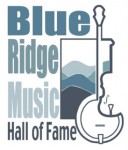 The Saturday after Doc’s services brought the celebratory atmosphere of the Blue Ridge Music Hall of Fame induction ceremony at the Stone Center for the Performing Arts in my former home town of North Wilkesboro, NC. Becky and I lived there from 2005 to 2007. During that time, I helped start the Hall of Fame, a project of the Wilkes Heritage Museum, and was inducted in its first class in 2008. Nonetheless, because of the annual conflict with Appalshop’s Seedtime on the Cumberland festival, I had never before attended the ceremony, that lent the evening especial personal meaning.
The Saturday after Doc’s services brought the celebratory atmosphere of the Blue Ridge Music Hall of Fame induction ceremony at the Stone Center for the Performing Arts in my former home town of North Wilkesboro, NC. Becky and I lived there from 2005 to 2007. During that time, I helped start the Hall of Fame, a project of the Wilkes Heritage Museum, and was inducted in its first class in 2008. Nonetheless, because of the annual conflict with Appalshop’s Seedtime on the Cumberland festival, I had never before attended the ceremony, that lent the evening especial personal meaning.
Despite long association with awards programs and a trophies over the years, Blue Ridge Music is the only Hall to which I belong. That was one more factor that made it personal, along with the recent death of Doc, also a 2008 inductee. The homecoming aspect proved profound. I ran into people I knew through music, MerleFest, and community.
Veteran Galax-area artist and banjo player Willard Gayheart was the first person I saw backstage. He was enjoying a jam on Carter Family songs. I appreciated the chance to watch Hall of Fame Committee members Nancy Watson (2009), a longtime colleague on the MerleFest team, and good friends Ann Graves, George Childers, Karen Krider, and Jennifer Furr hard at work on the production. I visited with ChickenFest founder Ken Welborn, his wife Laura, Wilkes bluegrass and Celtic musician R.G. Absher, and many other solid friends.
WKBC-AM’s Steve Handy, host of the popular Friday morning live performance radio show The Hometown Opry, served as emcee with characteristic wit and off handed charm. That this was the first ceremony without co-founder Dr. T.R. Bryan, who assumed leadership when I left for Appalshop made the event additionally personal. He received the first eponymous award Wilkes Heritage Music Award. His daughter and widow, neither of whom I had met previously, stopped me after the show to remind me how highly the pediatrician thought of me. Bryan spent a lifetime appreciating and supporting old-time and bluegrass in Wilkes.
Banjo master Eric Ellis (inducted in the second year 2009), the incomparable David Johnson (2008) on guitar, bassist Scott Gentry, and Scott Freeman on mandolin and fiddle powered the house band, who played a half-hour set prior to an inexplicable 90 minutes for dinner. Brushy Mountain Smokehouse and Creamery, owned by relatives of 2012 inductee and Wilkesboro native, the late easy listening star Bill Swofford, known as Oliver when he had Top 3 hits with Jean and Good Morning Starshine. Video from the Ed Sullivan Show included his brother, Johnny, the future inventor of college football’s BCS and architect of ACC expansion.
From Texas, the Chuck Wagon Gang toured the area frequently for many years and influenced the gospel scene of the Blue Ridge tremendously. Although only one direct descendent of the original members – the second Carter Family to shape rural American music – remains in the current Chuck Wagon Gang that performed and accepted induction, they aptly recreate one of the seminal styles of 20th Century white sacred music.
The third inductee this year, not directly associated with bluegrass or old-time music, was George Hamilton IV, born in the mountains and raised in Winston-Salem. Chapel Hill based Colonial Records, for which Andy Griffith and Allen Shelton made their first records, did have George on a few dates with Reno (2010) & Smiley promoting his teen pop hit Baby Ruth and a Pink Carnation. Dr. Charles Bentley, a cousin of Colonial founder Orville Campbell, made the presentation to George.
I have known Cindy Baucom, formerly of WKBC and now host of Knee Deep in Bluegrass and IBMA board member, since she was a teenager. We worked together for many years as MerleFest emcees. Jamie Daily of Dailey & Vincent made no small sacrifice to come to North Wilkesboro to offer the good humored but sincerely heartfelt induction presentation to his close friend, and then perform with Cindy, Terry, and her son Hunter. Due to the long dinner period, the hour grew late and the once capacity audience began to thin afterwards.
Tut Taylor, the flatpicking Dobroman and instrument maker who moved from Maryville, Tennessee to Wilkes in the 1990s, looked every bit his 88.5 years until he began to play after his induction into the Hall of Fame. Suddenly the veteran of John Hartford’s Aereoplain band and host of the Pickin’ Place at MerleFest, came to life doing what he loves.
No one seemed to have a better time than Phillip Jenkins, a bluegrass banjo player who accepted Blue Ridge Music Hall of Fame induction for his uncle Snuffy Jenkins. Snuffy had been playing banjo in bands for a dozen years before he become the first person to play what would become Scruggs-style banjo on the radio in 1937. The younger Jenkins delighted in playing the washboard and horn contraption that Snuffy first used working with comedian Greasy Medlin and fiddler Pappy Sherill on medicine shows. Phillip’s father Oren Jenkins played with Jim & Jesse, while Phillip has belong to the Far City Boys bluegrass gospel ensemble for 16 years. The washboard brought back fond memories of watching Snuffy perform from 1983 until his death in 1990 with Sherrill, Randy Lucas and his father, Harold. I enjoyed one such set at the Charlotte Country Music Story in 1985 with Mike Seeger.
I ran into scholar, open-back banjoist, and old-time and bluegrass DJ Kinny Rorer back stage. I last saw him at a scholarly conference about 2012 Blue Ridge Music inductee Charlie Poole shortly after Kinny had taken the reigns of Bill Vernon’s old show. He gave a brief speech equally informative and entertaining before playing a pair of Poole songs with his New North Carolina Ramblers. Almost 30 years ago Kinny took me around Eden (Leakesville-Spray-Draper), North Carolina introducing me to old musicians including Lewis McDaniel of the Carolina Buddies and the last two living members of Poole’s North Carolina Ramblers, Norman Woodlief and Lonnie Austin. If I Lose, Don’t Let Your Deal Go Down, and White House Blues all found their way to bluegrass in the 1940s and 1950s from Poole’s 1920s waxings.
Without David Holt’s mentorship, I would never have made that trip. Presenting David’s induction also made it personal. David took me way into “Bloody” Madison County, NC, past pot fields and fresh bear skins nailed to barns to dry to interview acapella ballad singer, moonshiner, and ginseng hunter Dellie Norton of Sodom. Working together on the Nashville Network Show, Fire on the Mountain, he brought me to the kitchen of Bea Smathers, whose husband Luke Smathers led the mountain swing band of the same name. They adapted to Bob Wills music to “old-time instruments.” With David I made my first visit to the Toast, NC home of Round Peak fiddler, banjo player, and 2008 inductee Tommy Jarrell, meeting Alice Gerrard, Paul Brown, Verlin Clifton, and Robert Sykes that same magical night.
Holt, also from Texas, who headed to California in the 1960s, possessed the right personality to pioneer bluegrass and old-time on public and cable TV with Folkways and Fire on the Mountain, where I met him in March 1983. Appreciating the music and stories only the way someone who is Appalachian by choice can, David conveys a deep joy that works on stage, TV, and public radio’s Riverwalk. He recorded with Doc and Merle, and performed many times with Doc and Richard. David appeared on the September 1983 cover of Bluegrass Unlimited, accompanying the first story I ever sold them about Fire on the Mountain.
Presenting his induction made me appreciate all this, and David and Ginny’s long friendship anew. The last couple of months haven given me deeper perspectives on friends, life, and the importance of staying connected.

